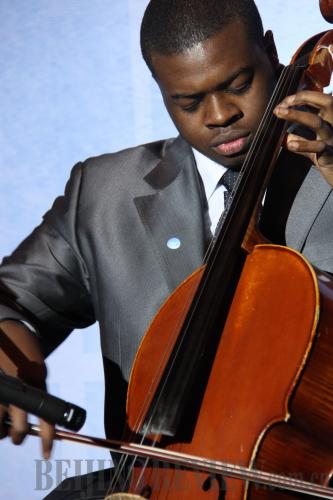|
 |
|
(COURTESY OF KEVIN OLUSOLA) |
How did you discover your unique musical fusion?
I was in China in 2008 doing a summer fellowship at the Harvard-Beijing Academy studying intensive Chinese. The students had to do a talent showcase for the Chinese teachers. As I was practicing in my room one day, I randomly thought to myself: What if I put the cello and beatboxing together? I tried it out, and I showcased it. Everyone really enjoyed it! I stopped doing it when I returned to Yale for my junior year because I thought the combination was "too weird" and "distasteful." However, when my cello teacher asked me to participate in the "Celebrate and Collaborate with Yo-Yo Ma" international competition, I tried it out again just because I thought it would make me stand out, regardless of the reservations I had. I won runner-up, and Yo-Yo Ma stated that my piece was "inventive and unexpected." It was that moment that I realized that this combination has a lot of potential.
In a family with a medical background, do your parents support your music career?
My father is a psychiatrist who originally hails from Nigeria, and my mother is a nurse originally from Grenada. They came from barely anything, but through the field of medicine, they were able to make a good living for themselves and their children. They have shared their reservations with me that doing music will possibly not provide me those essential things to live. However, they do see how I've finally "awakened" in my music.
How do your African roots impact your music?
The main impact my African roots have on my music is that I now understand that the groove, the beat, means absolutely everything. A lot of traditional African music uses only drums to provide a beat for dancing; no melody is involved. Furthermore, these beats can be quite complex. So being able to feel the groove so deeply within you that the only natural reaction is to dance will bring considerable energy to the music.
You recently completed a Yale Fellowship studying Chinese in Beijing. How was that experience?
The main impact studying Chinese has had on my life is understanding the process of mastering a language, which directly translates to my music (music is a language, you know).
In studying Chinese, memorization of interesting phrases is a helpful method for learning how to express oneself in the manner a Chinese person would. Currently, I'm studying jazz, and I found that listening and memorizing different musical phrases make my jazz playing sound more authentic.
What did you take away from performing in China?
From working with Chinese musicians, the vibe I've picked up is that they really work until their skill is perfected. Mistakes are not an option for them.
I personally believe that a lot of traditional Chinese music is driven by the melodic material. When I would I listen to Beijing opera, I imagine that the composer first thought of melody and its complexity and how it adheres to the framework of the story. I think the opposite is true of a lot of Western material. The melodies can be much simpler, but the complexity of the chords has a story and purpose to drive the whole piece. I want to figure out how to balance the two in order to create music that catches listeners' ears.
Who are your major influences?
In terms influences, Will Smith's attitude on life really inspires me. He believes that life is about how mentally tough you are, and if you possess iron will, you can achieve anything. I think Miri-Ben Ari is amazing. She revolutionized hip-hop on the violin. Not only was she musical, but her technical prowess was evident when she played. Also, Charlie Parker really influences me because apparently, he was horrible when he started, but he took his frustration and transformed it into 3-4 years of practicing up to 15 hours a day.
www. kevinolusola.com |